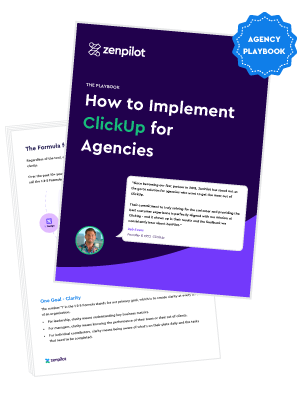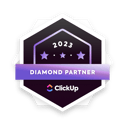How to Craft a Winning Hiring Process for Your Agency

“Candidate expectations have certainly accelerated. There's a difference today versus 10 years ago in terms of what people's expectations are and how fast other processes are going. And so moving quickly is an advantage in a hiring process—and figuring out how to move quickly without sacrificing on the process is a little bit of an art.”
Hiring is one of the most critical aspects of running a successful agency, yet it can also be one of the most challenging.
As an agency owner, you're constantly seeking top talent to help drive your business forward, but the process of finding, attracting, and securing the right people is often easier said than done.
If you don't approach hiring strategically, you risk bringing on team members who don't align with your agency's culture, values, or goals. This can lead to a host of problems, including decreased productivity, low morale, and high turnover rates.
On the other hand, if you master the art of hiring and build a team of A-players, you'll set your agency up for long-term success, with increased efficiency, innovation, and growth.
In this article, our very own Gray MacKenzie shares his insights on how to create a winning hiring process for your agency. Drawing from his experience at ZenPilot and the lessons learned from their recent search for an integrator, Gray offers actionable tips and strategies for finding and securing top talent.
For a video version of Gray's advice, you should check out the latest episode of the Agency Journey podcast. Watch the full video below:
For a thorough text version of Gray's key insights, read on!
Quick Summary – Action Points for Agency Owners
In condensed form, here are the steps of the hiring process that you should follow to get great results for your agency in a short time:
- Adopt a well-defined hiring process, such as the "Who: The A Method for Hiring" framework, to streamline your efforts and make better decisions.
- Keep the initial application stage simple to attract a wider range of candidates, including those who may not be actively seeking a new role.
- Evaluate candidates based on their past performance, using it as an indicator of future success within your agency.
- Protect your mental well-being during the hiring process by being selective about who you invest your time and energy in, focusing on the most promising candidates.
- Move quickly when following up with candidates to gain a competitive edge, but balance speed with thoroughness by having templated messages and additional information ready.
- Maintain positive relationships with all candidates, even those who don't receive an offer, by following up and looking for opportunities to make connections or provide value.
- Conduct thorough reference checks before extending an offer, using tools like LinkedIn to research a candidate's job history and identify potential unlisted references.
- Include live working sessions in your hiring process to assess how candidates approach real-world problems and collaborate with others.
- Involve your team in the hiring process, particularly when filling key positions, to gain valuable insights and foster a sense of ownership and investment in the decision.
- Tailor your interview questions to the specific role you're hiring for, focusing on the outcomes and skills that are most critical for success in that position.
Now, let's dive into the details one by one.
The Importance of a Defined Hiring Process
One of the most crucial elements of a successful hiring strategy is having a clear, well-defined process in place.
As Gray explains, "Have a defined process to run through. It gives you a totally different level of confidence as you show up in the hiring process. Say, 'Hey, I've got my stuff together. I know what the process is going to look like.' It also makes your candidates feel a lot more at ease to be able to map out for them: 'Here's what the process looks like."'
At ZenPilot, we primarily follow the "Who: The A Method for Hiring" framework, which helps them find the most stage-appropriate approach for their company.
By sticking to a single, proven framework, we can streamline our hiring efforts and make better decisions.
"We're just trying to find what seems the most stage efficient or stage appropriate for where we are. And then let's take one framework and follow that."
Using Past Performance to Predict Future Success
When evaluating candidates, Gray emphasizes the importance of looking at past performance as an indicator of future success.
"Past performance is the best indicator of future performance. How are we using that and the context around it to try to identify, hopefully, folks who will be A players moving forward? And run a really thorough process."
To gather this information effectively, we keep the initial application stage simple, allowing a wider range of candidates to enter the process.
"From that perspective, my approach is I want to keep the initial stage as simple as possible. I'd rather have a wider aperture, let more folks through and we'll do the screening. I don't want to miss out on somebody who would be a great fit, but maybe they're not looking super hard right now. And they don't want to jump through 47 different steps to initiate a conversation or at least know a little bit more about the opportunity."
Protecting Your Mental Well-Being During the Hiring Process
Hiring for key positions can be mentally and emotionally taxing, which is why Gray stresses the importance of protecting your own well-being throughout the process.
"I made a commitment to myself that for this specific role, I wanted to protect my own like mental state. And so I didn't want to interview anybody who was not—from the information that I'd gathered about them before talking to them—was not clearly like a 9/10 or a 10/10 fit for the role."
By being selective about who you invest your time and energy in, you can maintain clarity and focus, ensuring that you're dedicating your resources to the most promising candidates.
The Advantage of Moving Quickly
In today's competitive hiring landscape, moving swiftly can give your agency a significant edge.
"Continue to be as quick as is reasonable in follow-up with folks. Candidate expectations have certainly accelerated.
There's a difference today versus 10 years ago in terms of what people's expectations are and how fast other processes are going. And so moving quickly is an advantage in a hiring process and figuring out how to move quickly without sacrificing on the process is a little bit of an art."
To balance speed with thoroughness, Gray recommends having templated messages and additional information ready to go for candidates who make it past the initial screening stage.
"So I'd go through and if folks made it beyond that initial step, I had a second Loom and canned templated message ready to go that was sharing more of what I was specifically looking for that I didn't have out there, publicly posted."
Collaborating with Candidates Through Live Working Sessions
In addition to traditional interviews and reference checks, Gray highlights the value of conducting live working sessions with candidates.
"We moved into focused interviews as the next step—and in the Who methodology, that's one longer conversation. We broke it up and I pulled in other members of the leadership team to help with that."
"Folks who made it through that phase and had good grades, then moved on to a live working session with me. So we picked a real issue in the business—this was deep into the process and only a couple of folks—but we ran through a live working session together."
These sessions allow you to see how a candidate approaches real-world problems and collaborates with others.
"Hey, what does it feel like when we have to solve an issue together? Realizing that I know a whole bunch of the context and they know, none of the context—let's just walk through what it's like. For their benefit, to know 'who's this maniac who I'd have to work with?'. And then for my benefit to know like, hey, do our working styles fit?"
"And what I was looking for there is: how efficiently did we get to a good outcome? Can we work together at the right speed and pace? That's going to be super important in this specific relationship for me."
Tailoring Interview Questions to the Role
When conducting interviews, it's essential to ask questions that are relevant to the specific role you're hiring for. Gray shares examples of questions he asked during the integrator search, such as:
"What specifically are you looking for at this stage in your career? Like your next, the next chapter of your career. And I was clear, I want somebody who's in this, this is not a, there's no long-term contract or commitment. I'm going to force you to sign, but like you envision yourself going on this journey with us for the next three, five plus years, like this is a key role."
"I asked about the most effective and also the team size of the teams that they've led before and specifically what that looked like. So I was looking for who's led a leadership team."
By tailoring your questions to the role and the specific outcomes you're looking for, you can better assess a candidate's fit and potential for success within your agency.
The Critical Role of Reference Checks
Finally, Gray stresses the significance of conducting thorough reference checks before extending an offer.
"The final step, or almost final step, is the reference stage before you make an offer. The reference check piece is huge."
"Obviously, earlier in the process, we'd collect references from folks. And then at that point, obviously you're speaking to their on-paper references."
"But the other piece, really for any position and especially a key position is talking to the folks who they've had a relationship who they didn't list, as well."
To gather a comprehensive picture of a candidate's background and performance, Gray recommends using tools like LinkedIn to research their job history and identify potential unlisted references.
"Hey, what's their job history in the past? Who else worked there? Does it seem like there might have been a relationship here?"
Maintaining Positive Candidate Relationships
Even if a candidate doesn't end up joining your team, treating them well throughout the hiring process can have long-term benefits for your agency.
"Almost who [makes it far enough] in the process is somebody who could totally be successful in all likelihood at ZenPilot. And there may be a role for them at some point down the road."
Gray emphasizes the importance of following up with all candidates, even those who don't receive an offer, and looking for opportunities to make connections or provide value.
Frequently Asked Questions About Crafting a Successful Hiring Process as an Agency
Q1: Why is it important to have a well-defined hiring process?
A1: Having a defined hiring process gives you confidence as an agency owner and makes candidates feel more at ease. When you have a structured approach, you can clearly communicate what the process entails, demonstrating that you have your hiring strategy under control. This clarity and organization can help attract top talent and create a positive candidate experience.
Q2: How can I use past performance to predict a candidate's future success?
A2: Past performance is often the best indicator of how a candidate will perform in the future. By examining a candidate's track record and the context surrounding their achievements, you can gain valuable insights into their potential to become an A-player within your agency. Look for patterns of success, growth, and adaptability in their previous roles to help inform your hiring decisions.
Q3: How can I protect my mental well-being during the hiring process?
A3: To protect your mental well-being during the hiring process, be selective about who you choose to interview and invest your time in. Set high standards for the candidates you engage with, focusing on those who demonstrate a strong fit for the role based on the information you gather before the interview stage. By being discerning, you can conserve your energy and maintain clarity throughout the hiring process.
Q4: Why is it important to move quickly in the hiring process?
A4: In today's competitive job market, candidate expectations have accelerated, and top talent often receives multiple offers. By moving quickly in your hiring process, you can gain an advantage over other employers and secure the best candidates before they accept other opportunities. However, it's essential to balance speed with thoroughness, ensuring that you still follow a comprehensive evaluation process.
Q5: How can live working sessions help in the hiring process?
A5: Live working sessions provide a valuable opportunity to observe how a candidate approaches real-world problems and collaborates with others. By working together on a relevant issue, you can assess the candidate's problem-solving skills, communication style, and ability to work effectively with your team. These insights can help you determine whether the candidate's working style aligns with your agency's needs and culture, allowing you to make more informed hiring decisions.
Q6: Why should I involve my team in the hiring process?
A6: Involving your team in the hiring process, particularly when filling key positions, offers several benefits. Your team members can provide valuable insights and perspectives on the candidates, helping you gain a more comprehensive understanding of their potential fit. Additionally, involving your team fosters a sense of ownership and investment in the hiring decision, which can lead to greater commitment and support for the new hire once they join your agency.
Get more agency insights
Building an A-player team is essential for the long-term success and growth of your agency.
By implementing the strategies and insights shared by Gray, you can create a hiring process that attracts top talent, aligns with your agency's values, and sets you up for success.
To learn more about mastering the art of hiring for your agency, be sure to watch the full video: Crafting a Winning Hiring Process for Your Agency – Lessons Learned From Our Recent COO Recruitment.
And for more valuable insights and resources on agency operations and growth, follow Agency Journey on your favorite podcast platforms:
👉 Spotify
You can also follow us on YouTube.
See you in the next episode!
P.S. Agency Journey is brought to you by ZenPilot. We've helped 2,700+ agencies streamline their operations with the power of ClickUp. Get our free 56-page ClickUp Guide here. Or book a call with us to get an informed diagnosis of your agency ops issues.




